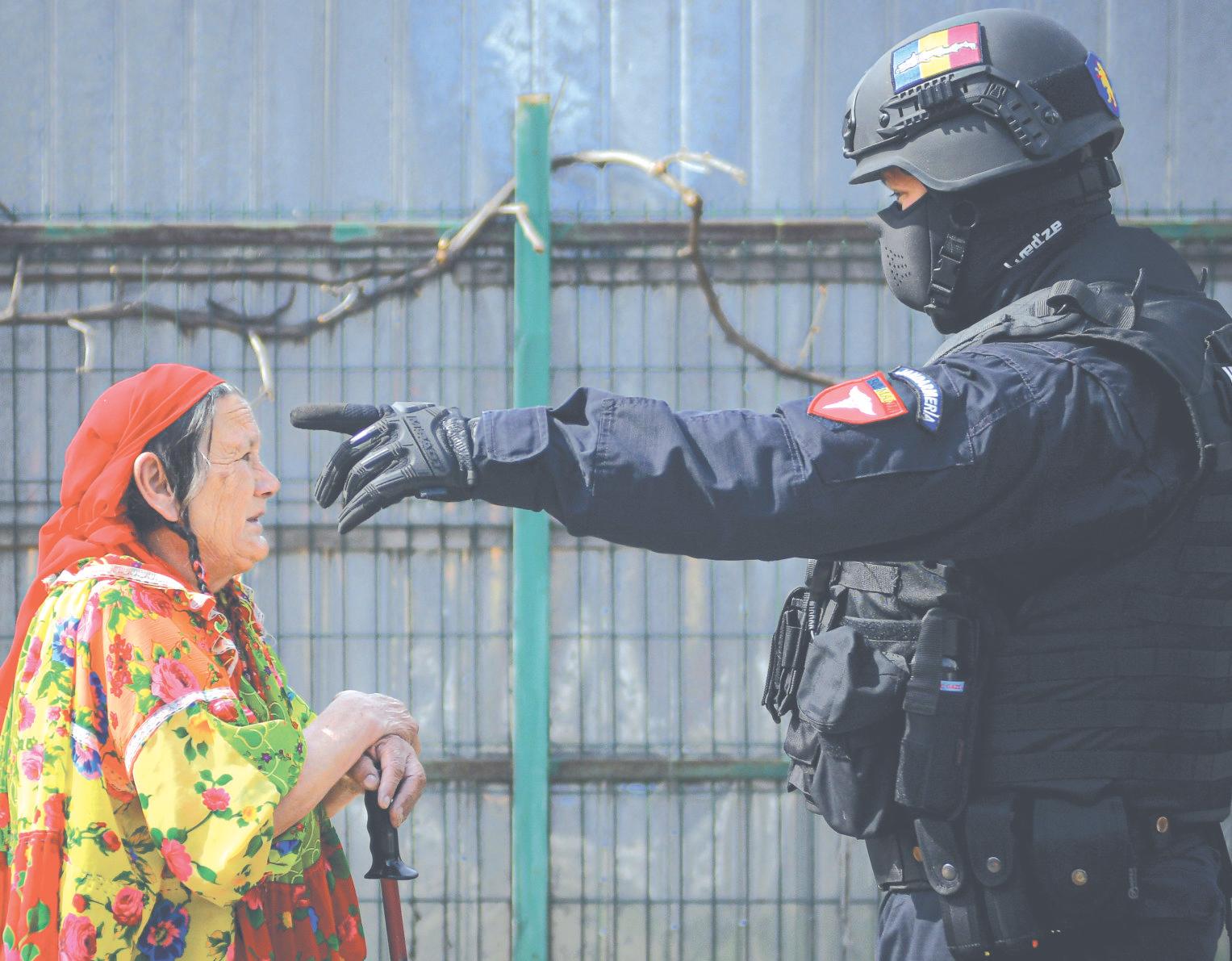
Killeen military vet inspired by personal misfortune to provide help and support for others
BY JOHN CLARK HERALD CORRESPONDENT
When Novice McDaniel was diagnosed with breast cancer two years ago, she went through the usual emotional turmoil but instead of focusing on her own difficulties, she decided to use her experiences to help other women in similar circumstances
The same week she started receiving treatment — successful treatment — the idea for a nonprofit organization to support other breast cancer sufferers began to take shape.
“I was diagnosed in January of ’22, and at that time, we were kind of coming out of COVID, so I was having a hard time finding a support group,” the longtime Killeen resident and U.S. Army veteran said. “I was going through radiation treatments — I never had to do chemo — and there was a lady who was always there, and she always looked defeated. We started talking and I told her about my vision and what I wanted to do
“That’s how Women Emerge started. I didn’t want anyone else to not be able to have a support system. I think just seeing that lady’s face and being able to see her smile let me know this is what I was supposed to do.”
Women Emerge Inc. is a group founded by McDaniel to provide that support. It has since expanded into helping victims of things like domestic violence, financial issues, and other concer ns.
“We’re not only breast cancer anymore,” said McDaniel, who serves as director and oversees a nine-member board. “I never wanted it to be only about breast cancer. We’re also a women’s empowerment organization. We want to empower women in all areas: domestic violence, finances, sickness, daycare for the kids if they need to go to a doctor’s appointment or shopping or something. We just want to be there for women.”
According to the group’s website, women-emerge.org, the organization seeks “to champion women to emerge from adversity by providing resources, networks, effective connections, and solutions to the issues that they face. Our purpose is to educate, motivate, encourage, restore, galvanize, and empower.
“Our vision is to see women, including breast cancer survivors, emerge from adversities to heal, thrive, and grow. We envision a society where women’s voices are heard, their contributions are valued, and their leadership is recognized. Together, we will ignite a movement that empowers women to survive and thrive inspiring generations to come.”
McDaniel was born in Williamston, North Carolina, near Greenville. She graduated high school in 1983 and promptly headed to Boston, Massachusetts, to try her luck in Beantown.
“I was a country girl going to the big city, with the hopes of going to college. I got there and started working. I did eventually go to college but not right away. I worked for a while and after a few years I went back to North Carolina because the big city really was too much for me. It wasn’t my cup of tea, so I went back but I didn’t want to be in a small town, either.

“I remember walking in the downtown area of my little town, and I saw the recruiting station, and I joined the Army. I joined in 1986 and got out in ’90. My plan was to stay in longer (but) I met my first husband (a soldier) and I wanted to be able to go wherever he went and be wherever he was and all those things, so I got out.
“I went overseas with my first husband to Italy, which was beautiful. We were there three years and came back to Killeen. We divorced in 2005 (and) I met my for-the-rest-of-my-life husband in 2007, and we were married in 2008.”
Along with managing and developing Women Emerge, McDaniel serves as dispatcher, administrative assistant, human resources manager, and whatever else is needed in the office for her husband’s trucking company, NeltaJoe Transport.
Needless to say, she stays plenty busy.
“I work from eight in the mor ning to maybe 12 or one, two o’clock the next morning,” said Novice, who holds a bachelor’s degree and a master’s degree in counseling, and a doctorate in biblical studies. “There is a drive … something that’s making me do it. I don’t feel like I’m working. I don’t feel tired. What I’m doing is a joy.
“A friend called and asked me to go to Darnall hospital on Fort Hood (now Fort Cavazos) and talk to a friend of hers who was having breast cancer surgery in the morning. She was taking it hard and didn’t have anyone to talk to. So, I got there, and we talked. I cried with her (and) we prayed together. She went through the surgery and she came out well. For a few months, she still had a

Novice McDaniel founded the nonprofit group Women Emerge, Inc. as a result of her breast cancer diagnosis two years ago COURTESY PHOTO
what I’m supposed to do — and I didn’t do that much. It was just showing up for somebody.”
Women Emerge meets now once a month for planning sessions, and the board meets quarterly. Anyone interested in joining the group or finding out more is invited to go to the website for more infor mation.
More than halfway through Women’s History Month, McDaniel, who is now cancer-free, says it is important to recognize the contributions made by women, throughout history and into the future
“I know a lot of women who do so much, and they are not recognized for what they do,” the mother of two and grandmother of two said. “My message is you can be who God says you are (and) you can do everything he says you can do. I just want to carry that positive message. We have been in business since 2022, and we have chapters in 17 states now
“I am able to minister and help women and give them that positive message that they’re going to be OK (and) God is in control.
“When I started this, it felt like a hand in glove — like this is what I’m supposed to be doing. It’s going very well. I would give us an ‘A.’ We’re trucking right along. I believe we’ve surpassed where I thought we would be by this time. We’re not there yet, but we’re setting things in order. Meeting with different people who can help us, so I can get the organization to where I want it to be.
hard time but every time I see her now, she runs up and gives me the biggest hug.
“I was so happy for her. She has joined Women Emerge (and) she’s getting ready to start helping me out with the breast cancer support group. That’s one of those stories that reinforces I am doing
“When I look back over everything I’ve done in my life, I’ve always had an affinity toward helping women to step up Years ago, I was in a domestic violence situation and once I got out of that, I always wanted to help other women. I believe it’s my calling.”

C2 WOM EN’S HIS TOR Y WEDNESDAY, MARCH 20 2024 | KILLEEN DAILY HERALD



An AP photographer on what motivates her as a woman in her profession
BY ANDREEA ALEXANDRU ASSOCIATED PRESS
BUCHAREST, Romania — Andreea Alexandru is a photographer who works with The Associated Press in Bucharest, Romania. Alexandru has covered riots, elections, sporting events and cultural events. Her overseas assignments have included the coronation of Britain’s King Charles III. This feature is part of a series high-
lighting Associated Press journalists for Women’s History Month. An earlier installment featured one of our photographers who has documented violence against women in Haiti.
Itry to look at adversity as motivation and opportunity to evolve, both in social interactions and photography It makes me try to communicate better with people, because adversity and
discrimination start from fear and bad communication. It is, obviously, easier said than done, but for me it is the only way to go
My photography adventure started when I was about 15 years old and I took photos for the first time, at a family wedding. Everyone adamantly told me they were so bad that it was clear I was never going to be able to take a decent photograph in my life. Their words still ring in
my head and they still work as a twisted motivational mantra.
Some members of my family occasionally compliment me on my work and then in the same sentence they say: “you should have kept your decent architect job, this one is not for women.” I try to take it as a pep talk.
Yes, it is tougher as a woman in profes-
PLEASE SEE PHOTO, C4

KILLEEN DAILY HERALD | WEDNESDAY, MARCH 20, 2024 WOM EN’S HIS TOR Y C3
PHOTOS BY ANDREEA ALEXANDRU AP
A refugee fleeing the conflict from neighbouring Ukraine holds her baby as she sits in a tent at the Romanian-Ukrainian border, in Siret, Romania, on Feb. 26, 2022. As a woman photojournalist Andreea thinks “it is tougher as a woman in professions regarded as male territory but it’s not at all hopeless: just a few generations ago, most professions were considered “men only,” and that changed so drastically that it’s hard to imagine times like that ever existed.”
A riot police o cer gestures while trying to turn an elderly Romanian Roma woman away from a place where people were illegally burning scrap containing metal during a raid by the National Environmental Guard in Vidra, Romania, on April 13, 2021. As a woman photojournalist, Andreea says “I, much like every woman, o en feel some level of discrimination, either manifested openly or in a more veiled manner. However, that is nowhere near what women face in disadvantaged social groups where access to education is not a given or minimum decent living conditions are not met.”


A
PHOTO
FROM PAGE C3
Aug. 10,
sions regarded as male territory but it’s not at all hopeless: just a few generations ago, most professions were considered “men only,” and that changed so drastically that it’s hard to imagine times like that ever existed.
PHOTOS COURTESY OF ANDREEA ALEXANDRU AP

Men ride on a swing at a fair in Hagioaica, Romania, on Sept. 14, 2023. As a woman photojournalist Andreea thinks “it is tougher as a woman in professions regarded as male territory but it’s not at all hopeless: just a few generations ago, most professions were considered “men only,” and that changed so drastically that it’s hard to imagine times like that ever existed.”
I, much like every woman, often feel some level of discrimination, either manifested openly or in a more veiled manner. However, that is nowhere near what women face in disadvantaged social groups where access to education is not a given or minimum decent living conditions are not met. I would trivialize the everyday plight of all women suffering unimaginable discrimination if I gave examples of the low-level aggression I am faced with.


That is not to say that any level of discrimination should be accepted, but realism and perspective are a must, otherwise we end up hurting the very cause we are fighting for. If I compare climbing a flight of stairs to reaching the peak of mount Everest, nobody will take me seriously
That is a risk I won’t take — the most horrible things start with people thinking matters are not that serious
A colleague always says: We’re fantastic beings, running very flawed software. I believe in software upgrades — we have come a very long way, there is still a long way to go
We’ll get there if everyone does their part.

C4 WOM EN’S HIS TOR Y WEDNESDAY, MARCH 20 2024 | KILLEEN DAILY HERALD
teargas canister explodes as riot police charge using canon to clear the square during protests outside the government headquarters in Bucharest, Romania, on
2018. As a woman photojournalist Andreea thinks “it is tougher as a woman in professions regarded as male territory but it’s not at all hopeless: just a few generations ago, most professions were considered “men only,” and that changed so drastically that it’s hard to imagine times like that ever existed.”

KILLEEN DAILY HERALD | WEDNESDAY, MARCH 20, 2024 WOM EN’S HIS TOR Y C5

Relative of East Texas woman who portrayed Aunt Jemima keeps her legacy alive
BY KATECEY HARRELL TRIBUNE NEWS SERVICE
Yesterday’s Tomorrow, a Black history museum, marked the end of Black History Month and the start of Women’s History Month with a Saturday event in Tyler featuring a relative of Lillian Richard — the face of Aunt Jemima from 1925 to 1940.
Aunt Jemima was an advertisement for a ready-made pancake mix introduced in 1889.
Because Richard, who was from Hawkins, had no children, her great niece, Vera Richard Harris, is a spokeswoman for the family
Harris said sharing her story ensures that Richard’s legacy lives on for future generations and makes Black history vital to American history.
Harris told the story of Aunt Jemima, Richard’s impact on their family and community of Hawkins — the Pancake Capital of Texas — and continuing her legacy
The event also featured the work of writer and playwright Kishia Boddie, known as MsBoddie SpeakLife, whose works include “Abstract Thought of She” and “I Met My King.”
Yesterday’s Tomorrow is a local nonprofit organization celebrating the history and achievements of African Americans through its mobile exhibits and library called the Fields African American Center of Education and Studies, or F.A.A.C.E.S.
Founder and curator Marlondos Fields said Sonya Blair, owner of Beauty Break salon in Tyler, heard about his mission and connected him with Harris about her aunt’s legacy. Boddie and Harris are both Black women and military veterans
“I thought it was a wonderful way to open up for women’s history,” Fields said.
In 1890, Nancy Green, who was born into slavery, was the first of 12 Black women to promote PepsiCo Inc., the parent company for Quaker Oats, pancake products. Operating a pancake cooking display at the World’s Fair in Chicago in 1893, Aunt Jemima was born.
Richard was the third person to portray and give demonstrations at fairs and other public places as Aunt Jemima. Harris said when Richard visited Hawkins, she was a hometown celebrity.
It was rare for a Black woman to achieve a high-profile, well-paying job in 1925.
“She was doing something back in the early 1900s that was unheard of,” Harris said. “To be a Black woman being picked to represent and promote serving pancakes was probably a dream come true.” Harris believes Richard found pleasure from traveling the country promoting products, and it certainly brought her family pleasure to hear the stories Richard’s legacy and what she represents have brought her family joy
“They were honored to have a job like that,” Harris said.
In June 2020, acknowledging the brand’s origins rooted in a racial stereotype, Aunt Jemima was rebranded to

Pearl Milling Co. Harris said although the image wasn’t offensive to her, she understood that some people found the image degrading and supported its removal.
The women behind the character, such as Richard, were real people trying to achieve their dreams. Harris believes they were chosen for the role because of their bubbly personalities
Harris said although there is no truth in stories of “plantation bliss,” women like Richard were paid to play the role of a “smiling, happy Aunt Jemima” and to tell stories of the “good old plantation days,” according to the Jim Crow Museum.
Today, Harris said the job function would be related to public relations or as a brand ambassador with a generous salary.
“It was hard back then for us as African Americans to get any kind of job, let alone a great job,” Harris said. “It is our job as the Richard family to continue to speak and talk about her.”
Harris hopes Richard’s story can inspire the next generation of women to do extraordinary things.
“You can be in Small Town, USA, and still have an impact because that’s what she did,” Harris said.
In 2001, the city of Hawkins declared Lillian Richard Day on her birthday March 23, and since then, an annual pancake breakfast has been held in her honor.
Harris takes pride in the fact that her aunt’s legacy is still remembered almost

a century after Richards became the face of Aunt Jemima. She encourages people to share their stories about the past to honor important parts of history that the community should never forget.
“Black history, women’s history is America’s history,” Harris said. “If a (Black) woman wasn’t recognized in February, we got another 30 days to recognize those women.”


C6 WOM EN’S HIS TOR Y WEDNESDAY, MARCH 20 2024 | KILLEEN DAILY HERALD
KATECEY HARRELL/ TYLER MORNING TELEGRAPH
Vera Richard Harris, great niece of Lillian Richard, is seen next to a photo of Richard, a Hawkins native who was the face of Aunt Jemima from 1925 to 1940.


















